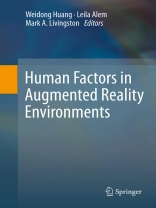Advances in hardware and networking have made possible a wide use of augmented reality (AR) technologies. However, simply putting those hardware and technologies together does not make a “good” system for end users to use. New design principles and evaluation methods specific to this emerging area are urgently needed to keep up with the advance in technologies.
Human Factors in Augmented Reality Environments is the first book on human factors in AR, addressing issues related to design, development, evaluation and application of AR systems. Topics include surveys, case studies, evaluation methods and metrics, HCI theories and design principles, human factors and lessons learned and experience obtained from developing, deploying or evaluating AR systems. The contributors for this cutting-edge volume are well-established researchers from diverse disciplines including psychologists, artists, engineers and scientists.
Human Factors in Augmented Reality Environments is designed for a professional audience composed of practitioners and researchers working in the field of AR and human-computer interaction. Advanced-level students in computer science and engineering will also find this book useful as a secondary text or reference.
İçerik tablosu
Issues in human factors evaluations of augmented reality systems.- Human factors research in audio augmented reality.- Basic perception in head-worn augmented reality displays.- Pursuit of ‘X-ray Vision’ for augmented reality.- Cognitive issues in mobile augmented reality: an embodied perspective.- Mobile augmented reality: a design perspective.- Design guidelines for mobile augmented reality – user experience.- Usability recommendations for mixed interactive systems: extraction and integration in a design process.- Concepts and subjective measures for evaluating user experience of mobile AR services.- Enhancing user roles in augmented reality interactive simulations.- Interactive AR installations: lessons learned in the field of art, design and cultural heritage.












